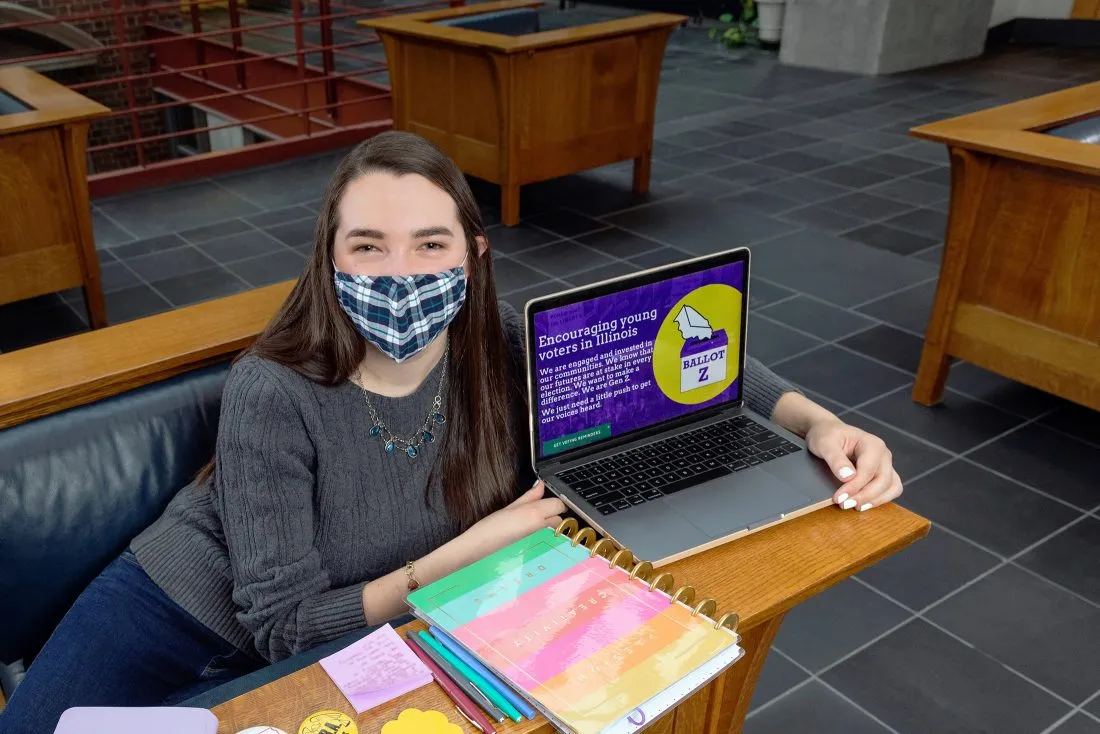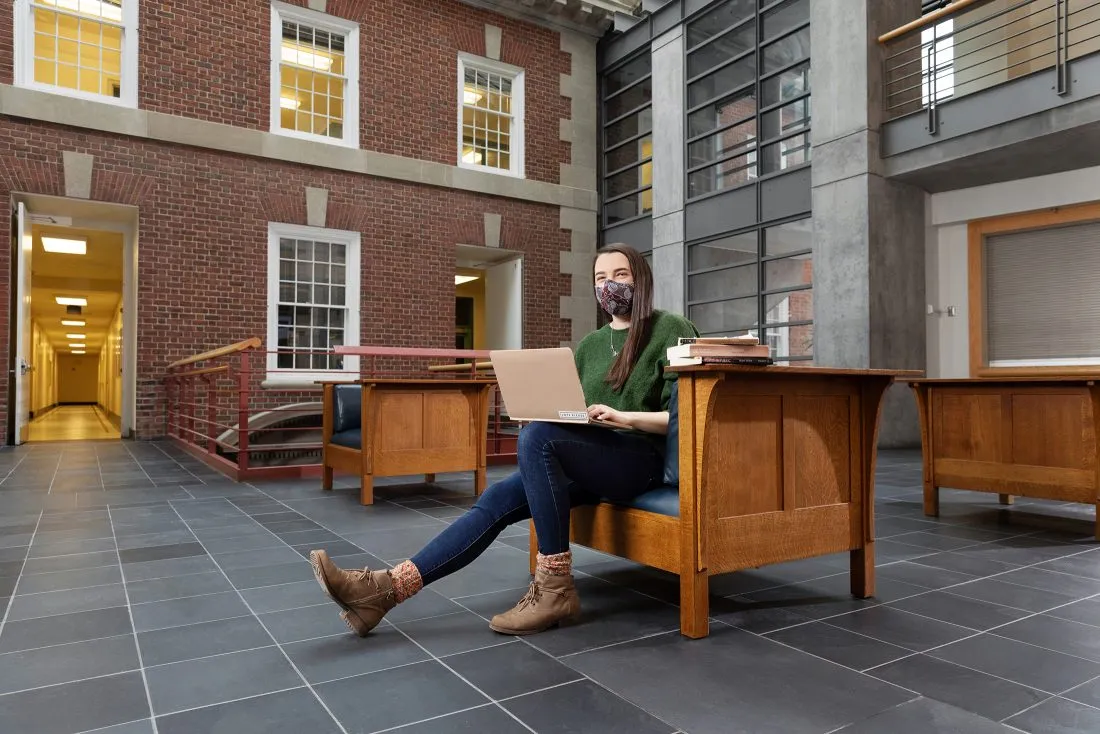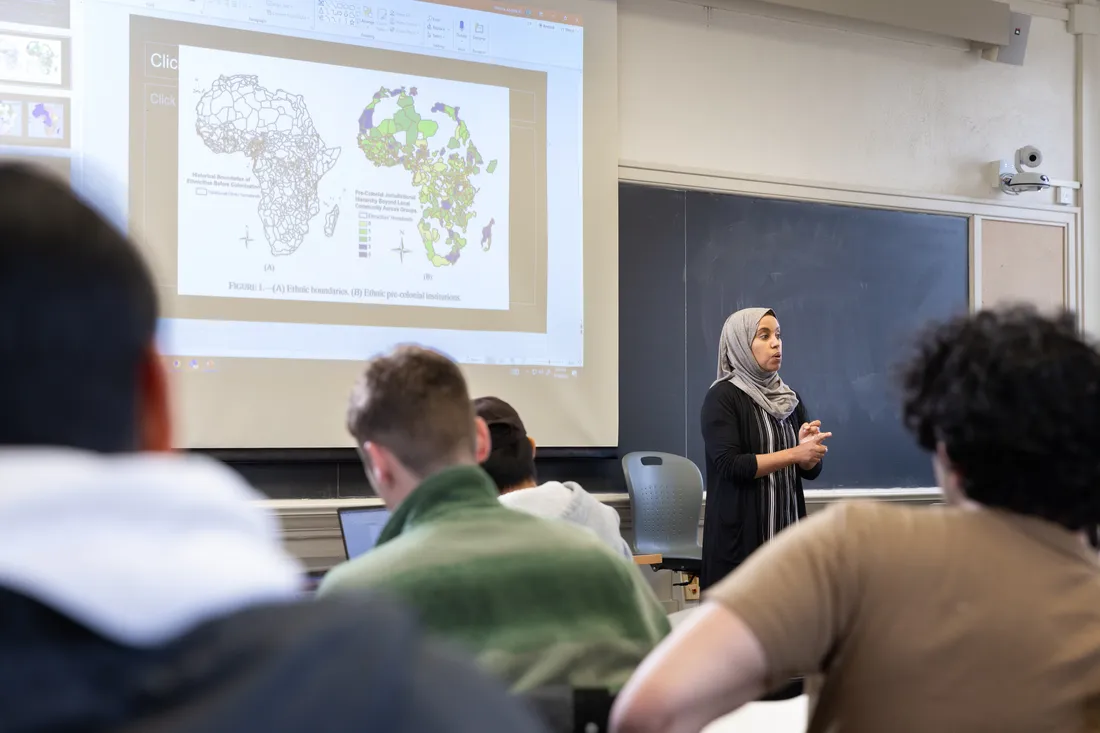
Gretchen Coleman is the founder of Ballot Z, a nonpartisan organization dedicated to increasing turnout among young voters.
Syracuse University junior Gretchen Coleman ’22 never backs down from a challenge. So, when the 2021 Truman Scholarship finalist recognized that young voters consistently turn out in lower numbers than older generations, she founded Ballot Z , a nonpartisan organization dedicated to broadening youth voting in her home state of Illinois.
Coleman is a dual major in political philosophy and political science, spanning the College of Arts and Sciences and the Maxwell School of Citizenship and Public Affairs . She says her studies, combined with Ballot Z and the possibility of a Truman Scholarship—the nation’s premier award for those pursuing public service leadership—will help prepare her for a career in election reform. “Many young people don’t vote because they don’t realize how easy it is to do,” says the Chicago native, who launched Ballot Z last spring. “I’ve consolidated election information into a single website, providing a one-stop shop for voting in Illinois.”
She is familiar with the myths and misconceptions about voting—that her peers are too busy to register, or that their individual votes don’t matter, or that presidential elections are the only ones that count. “Many people think voting is more complicated than it really is. Ballot Z makes reputable voting information easy to find online,” Coleman continues. “We just need a little push to get our voices heard.”
Getting Out the Vote
It helps that Coleman is part of her target audience. At 21, she is a member of Gen Z (those born between 1997 and 2015). Several times a week, Coleman creates and uploads content to the internet about election procedures, voting resources and changes in voting laws. She also is a sought-after public speaker, discussing the importance of “getting out the vote” with anyone willing to listen—fellow students, parents, civic groups and reporters.
That young voters were a decisive force in the 2020 general election underscores the urgency of her work. “The youth vote in November was the highest in years,” she says, noting that the turnout among people ages 18-29 was up 8% from 2016. “Because of the pandemic, grassroots organizations like mine have shifted from in-person to online formats to garner young, unregistered voters.”
Many people think voting is more complicated than it really is. Ballot Z makes reputable voting information easy to find online. We just need a little push to get our voices heard.
Gretchen Coleman
One of her staunchest allies is Rose Colacino at Indivisible Illinois, part of a nationwide network of organizations dedicated to voting advocacy and electoral work. The two sparked a friendship this past fall, when Colacino convinced Coleman to give an online presentation about Ballot Z and digital organizing in general.
“I wanted to educate our base on how to expand the electorate for the November 2020 election,” says Colacino, who subsequently partnered with Coleman on promoting the Georgia senate runoff elections. “Gretchen has made it her mission to encourage the youth vote and to address voter apathy through civic education, with a goal of developing an engaged and informed citizenry.”
Creating a Sense of Belonging
When it came time for college, Coleman chose Syracuse University because she wanted to expand her horizons. Arts and Sciences selected Coleman as a Coronat Scholar , entitling her to a full-tuition scholarship and admission to the Renée Crown University Honors Program .
It was during a Coronat-related visit to campus that Coleman befriended Amanda Paule ’22. “I was struck by how passionate she was about everything she did,” says Paule, who would become Coleman’s roommate. Paule recalls how, during that visit, Coleman organized a March for Our Lives event supporting gun-control legislation. The high school senior also spent her free time following the results of a campaign she was working on for the Illinois primary election.
Another longtime friend, Ryan Peiffer ’22, met Coleman during first-year orientation. “I feel like I can come to her with any problem, be it personal or academic, and she’s willing to listen,” he says. “Gretchen is always looking out for others, even if they’re total strangers, to make sure they feel accepted and included.”

Coleman is a 2021 finalist for the Truman Scholarship, the nation’s premier award for those pursuing public service leadership.
Shaping Community and Country
Coleman is conducting research for her Honors thesis project, which analyzes political trust and distrust among her peers. She insists that a shortage of trust in any kind of government—local, state or federal—stands in the way of solving key problems.
“Majoring in political science and political philosophy enables me to learn about current political issues and the underlying theories behind them. It’s critical to ask the big questions about our political systems if we want to enact lasting change,” says Coleman.
Advisor Nathan Raybeck marvels at Coleman’s intellectual prowess, noting her desire to understand every “facet and nuance” of an issue. “Gretchen is unwavering in her democratic ideals, and she brings meaningful change to voting reform. Her determination gives me hope for our political future.”
Coleman is equally busy outside the classroom, serving as treasurer for the campus chapter of the College Democrats of America and a student research mentor for the Syracuse University Office of Undergraduate Research and Creative Engagement (SOURCE). She also helps manage social media platforms for the SOURCE, honing skills and insights that translate to her work at Ballot Z, which relies heavily on Instagram, Twitter and Facebook.
“Social media has taught me a lot about user attitudes and behaviors as well as how young people wield power,” says Coleman, who has interned for New York State Senator Rachel May; Illinois Congressman Sean Casten; and the Moroccan Institute for Policy Analysis in the capital city of Rabat, where she also participated in the Syracuse Abroad World Partner program AMIDEAST Area and Arabic Language Studies in Morocco.
Explaining that Millennials and members of Gen Z account for 37% of the electorate, Coleman says technology shapes the way young voters are registered and mobilized. “It takes less than two minutes to register to vote by phone,” she continues. “Making our voices heard by voting is one of the easiest, most effective ways to bring about change. It is a duty and a privilege.”


